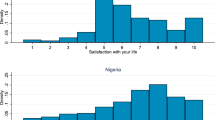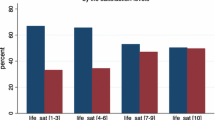Abstract
This paper addresses issues of causal direction in research on subjective well-being (SWB). Previous researchers have generally assumed that such variables as domain satisfactions, social support, life events, and levels of expectation and aspiration are causes of SWB. Critics have pointed out that they could just as well be consequences (Costa and McCrae, 1980; Veenhoven, 1988). In some contexts this has been referred to as the top-down versus bottom-up controversy (Diener, 1984). The main purpose is to propose a general statistical model which holds promise of resolving this controversy. The model can be used when three or more waves of panel data are available. It is used here to assess causal direction between six domain satisfactions (marriage, work, leisure, standard of living, friendship and health) and SWB. Data are drawn from four waves of an Australian Quality of Life panel survey (1981–1987) with an initial sample size of 942.
Similar content being viewed by others
References
Andrews, F. M. and Withey, S. B.: 1976, Social Indicators of Well-Being (Plenum, New York).
Argyle, M.: 1987, The Psychology of Happiness (Methuen, London).
Bradburn, N. M.: 1969, The Structure of Psychological Well-Being (Aldine, Chicago).
Campbell, A., Converse, P. E., and Rodgers, W. R.: 1976, The Quality of American Life (Sage, New York).
Carmines, E. G. and McIver, J. P.: 1981, ‘Analysing models with unobserved variables’, in G. W.Bohrnstedt and E. F.Borgatta (eds.), Social Measurement: Current Issues (Beverley Hills, Sage).
Costa, P. T. and McCrae, R. R.: 1980, ‘Influence of extraversion and neuroticism on subjective well-being’, Journal of Personality and Social Psychology 38, 668–78.
Costa, P. T. and McCrae, R. R.: 1984, ‘Personality as a lifelong determinant of well-being’, in C.Malatesta and C.Izard (eds.), Affective Processes in Adult Development and Agiing (Beverley Hills, Sage).
Diener, E.: 1984, ‘Subjective well-being’, Psychological Bulletin 95, 542–75.
Eysenck, H. J. and Eysenck, S. B. G.: 1964, Manual of the Eysenck Personality Inventory (Hodder and Stoughton, London).
Greenberg, D. F. and Kessler, R. C.: 1982, ‘Equilibrium and identification in linear panel models’, Sociological Methods and Research 10, 435–51.
Headey, B. W., Holmstrom, E. L. and Wearing, A. J.: 1985, ‘Models of well-being and ill-being’, Social Indicators Research 17, 211–34.
Headey, B. W. and Wearing, A. J.: 1988, ‘The sense of relative superiority: central to well-being’, Social Indicators Research 20, pp. 497–516.
Headey, B. W. and Wearing, A. J.: 1990, What Makes for Happiness? A Theory of Subjective Well-Being (forthcoming).
Hoelter, J. W.: 1983, ‘The analysis of covariance structure’, Sociological Methods and Research 11, 325–44.
Joreskog, K. G. and Sorbom, D.: 1978, LISREL IV (International Educational Services, Chicago).
Kenny, D. A.: 1979, Correlation and Causality (Wiley, New York).
Kessler, R. C. and Greenberg, D. F.: 1981, Linear Panel Analysis (Academic Press, New York).
Kohn, M. L. and Schooler, C.: 1983, Work and Personality (Ablex, Norwood, N.J.).
Rogosa, D. R., Brandt, D., and Zimowski, M.: 1982, ‘A growth curve approach to the measurement of change’, Psychological Bulletin 90, 726–48.
Rogosa, D. R. and Willet, J. B.: 1985, ‘Understanding correlates of change by modeling individual differences in growth’, Psychometrika 50, 203–28.
Veenhoven, R.: 1984, Conditions of Happiness (Reidel, Dordrecht).
Veenhoven, R.: 1988, ‘The utility of happiness’, Social Indicators Research 20, 333–54.
Author information
Authors and Affiliations
Additional information
We particularly thank Ronald C. Kessler of the University of Michigan for his advice on statistical issues. We are also very grateful for comments from Frank M. Andrews of the University.of Michigan and Mariah Evans and Jonathan Kelley of Australian National University. Constructive comments from an anonymous SIR reader also led to significant revisions.
Rights and permissions
About this article
Cite this article
Headey, B., Veenhoven, R. & Wearing, A. Top-down versus bottom-up theories of subjective well-being. Soc Indic Res 24, 81–100 (1991). https://doi.org/10.1007/BF00292652
Received:
Issue Date:
DOI: https://doi.org/10.1007/BF00292652




